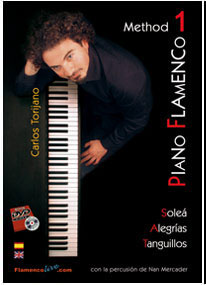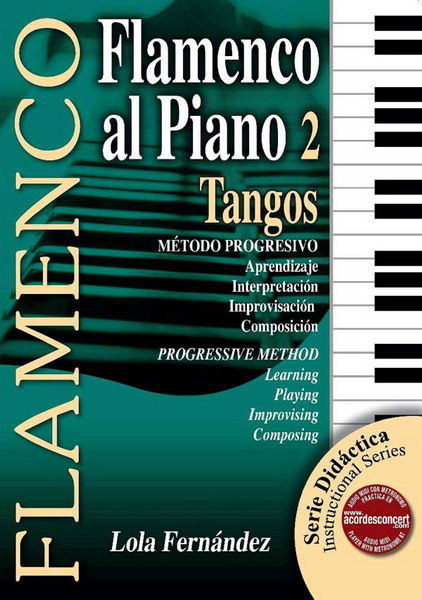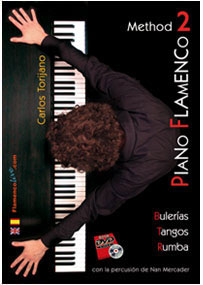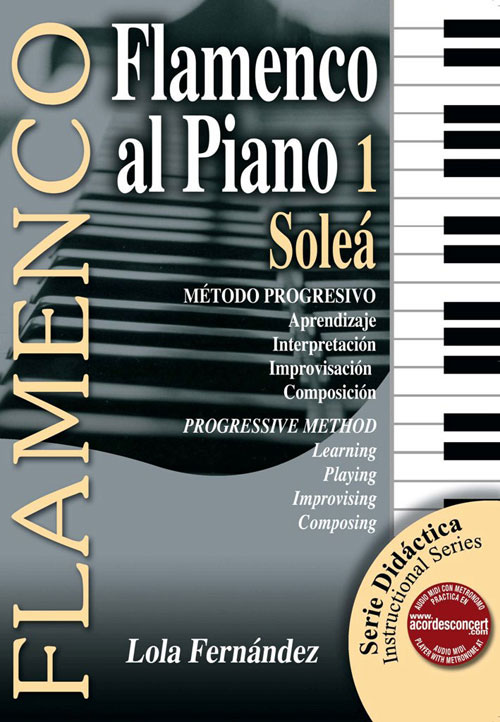- 🚚 📦 WORLDWIDE SHIPPING ✈️ 🌍
Flamenco Piano method by Carlos Torijano. Vol.1
This Book/DVD “Flamenco piano method” by Carlos Torijano, makes closer the flamenco to those pianists who are interested in understanding its bases, rhythmical and harmonic structures. In this way, with the study of this method, the pianist will be able to play Solea, alegrias and tanguillos.
Once the different elements of each palo (sing style) learnt the pianist could interpret a specific palo at the piano solo and as well accompany to basic level, a singer.
The study format is very useful, following the structure for each palo (styles):
Previous explanation of the origin
Harmony Rhythmic
Speed Introduction
Basis or soniquetes
Falsetas closed interpretation of the complete theme
Soniquetes and falsetas of each palo are studied by increasing difficulty order, by normal and slow speed.
The soniquetes are the Standards or rhythmical variations used to accompany the sing; giving to the singer a strong rhythmical basis meanwhile he plays different thirds of the theme.
The falsetas are the variations where the singer replies to the guitarist (to the pianist in this case) and where he plays a melody as a soloist before letting sing the singer.
The total structure of each piece is the result of each one of the structures called variations. With the aim of a rhythmic understanding of everything in this DVD, on each exercise the following information has been put:
- The “digitación” it is not the only one possible but it is the easiest, according to our experience.
- The harmonica analysis: in each exercise, the different level of each tonality, as the corresponding harmonious. In this way, it’s easier to transport other tonalities.
- In the palos of 12 times (Solea, Bulerias and Alegrias) the number of compas has been added to know in which point the cycle of the palo we are in each moment.
As introduction before the palo study, there’s an explanation of Flamenco Harmony with previous exercises:
Diatonic harmonic system
Modal harmonic system
Main harmonious
Previous flamenco harmonious exercises with tonalities the most used Andalusian cadence exercises: Gregorian modes and corresponding scales.
Several sound options are given: piano + accompaniment (guitar, palmas, metronome, cajon), piano solo, accompaniment solo.
Piano: Carlos Torrijano Percussion: Nan Mercader
2 languages: Spanish, English
DVD compatible for all countries (PAL and NTSC).
This Book/DVD “Flamenco piano method” by Carlos Torijano, makes closer the flamenco to those pianists who are interested in understanding its bases, rhythmical and harmonic structures. In this way, with the study of this method, the pianist will be able to play Solea, alegrias and tanguillos.
Once the different elements of each palo (sing style) learnt the pianist could interpret a specific palo at the piano solo and as well accompany to basic level, a singer.
The study format is very useful, following the structure for each palo (styles):
Previous explanation of the origin
Harmony Rhythmic
Speed Introduction
Basis or soniquetes
Falsetas closed interpretation of the complete theme
Soniquetes and falsetas of each palo are studied by increasing difficulty order, by normal and slow speed.
The soniquetes are the Standards or rhythmical variations used to accompany the sing; giving to the singer a strong rhythmical basis meanwhile he plays different thirds of the theme.
The falsetas are the variations where the singer replies to the guitarist (to the pianist in this case) and where he plays a melody as a soloist before letting sing the singer.
The total structure of each piece is the result of each one of the structures called variations. With the aim of a rhythmic understanding of everything in this DVD, on each exercise the following information has been put:
- The “digitación” it is not the only one possible but it is the easiest, according to our experience.
- The harmonica analysis: in each exercise, the different level of each tonality, as the corresponding harmonious. In this way, it’s easier to transport other tonalities.
- In the palos of 12 times (Solea, Bulerias and Alegrias) the number of compas has been added to know in which point the cycle of the palo we are in each moment.
As introduction before the palo study, there’s an explanation of Flamenco Harmony with previous exercises:
Diatonic harmonic system
Modal harmonic system
Main harmonious
Previous flamenco harmonious exercises with tonalities the most used Andalusian cadence exercises: Gregorian modes and corresponding scales.
Several sound options are given: piano + accompaniment (guitar, palmas, metronome, cajon), piano solo, accompaniment solo.
Piano: Carlos Torrijano Percussion: Nan Mercader
2 languages: Spanish, English
DVD compatible for all countries (PAL and NTSC).

















